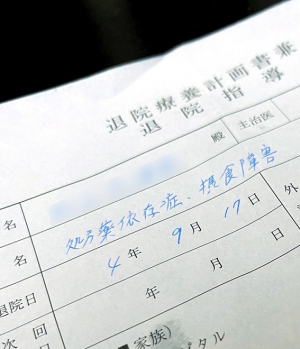
A medical document shows that a woman raised as a second-generation Jehovah’s Witness suffers from an eating disorder. (Provided by the woman)
A woman in her 40s from the Kanto region raised as a second-generation Jehovah’s Witness is speaking out about the trauma she experienced growing up while belonging to the religious group.
Twenty years have passed since she left the Christian denomination, which has some 210,000 followers in Japan, but she still suffers from an eating disorder and suicidal thoughts she attributes to adhering to its strict rules.
“Every time I remember those days, I feel crushed,” said the woman, who wishes to remain anonymous. “I think there are still many followers struggling, and I want as many of them as possible to be saved.”
The woman said her mother started going to a facility run by the religious group when she was in the lower grades of elementary school and, while her father was against it, her mother started forcing the religious doctrine and lifestyle on her.
She was told to cut ties with her friends unless they too were followers, and she was banned from attending school events such as Christmas and birthday parties.
She was told to prioritize attending religious meetings and studying the Bible above school, and her mother dictated what clothes she wore and what books she read.
The hardest thing for her at that time, she said, was going door-to-door with her mother to promulgate the faith.
Holding the Bible, she would push the door buzzer, again and again--sometimes at the homes of her classmates.
Hiding behind her mother, she prayed, “Please, don’t answer the door.”
But some classmates would, and then made fun of her for the way she stayed motionless and dropped her eyes.
When she entered her third year of high school, a church facilitator told her to “prioritize missionary work” and discouraged her from going to university.
She had no choice but to abandon her dream to one day become a nurse.
And when she underwent an operation at the age of 18, she had to tell the doctor that she did not want to have a blood transfusion because her religion bans it.
She was given a general anesthetic and, as she lost consciousness, she thought to herself, “I will die like this.”
Under constant stress, she battled with binge eating and anorexia, and her weight would fluctuate wildly, from about 40 kilograms to 84 kg.
When her father died from an illness when she was 24, she was banned from attending his funeral--a Buddhist ceremony.
That was the last straw for her, and she told her mother, “Let me leave the church.”
Her story is one of many, according to a new group aimed at supporting people raised as second-generation Jehovah’s Witnesses in Japan and helping them leave the faith or launch legal suits if their cases are “heinous.”
“We want to save as many followers and former followers who have been oppressed as possible,” a representative said.
The group is made up of 15 lawyers and doctors, six of which are former followers raised as second-generation Jehovah’s Witnesses.
It formed not long after the health ministry released new guidelines at the end of 2022 about faith-related abuse.
The guidelines were made in response to children of members of the Unification Church calling for new protective measures, after they spoke out about how belonging to that group had ruined their families.
The new guidelines state that forcing someone to refuse a blood transfusion based on a religious belief is considered a form of neglect.
The support group on Feb. 27 provided the health ministry details about what it has learned from 78 consultations with followers and former followers about alleged child abuse.
In 77 of the 78 cases, people said they were whipped and forced to believe the organization’s teachings when they were young.
The remaining case was that the person was banned from having a blood transfusion.
Kotaro Tanaka, a lawyer and member of the support group who grew up under the faith, said it puts followers between a rock and a hard place because it teaches them not to contact family members who have left the denomination.
“There are many people who suffer because they want to leave the group but cannot do so because they don’t want to lose contact with their family," Tanaka said.
But a representative of the Japanese branch of Jehovah’s Witness said the complaints being voiced against it are false and misleading.
“There have been distorted reports and wrong conclusions based only on comments made by disgruntled people who used to be related to (Jehovah’s Witnesses), and such opinions are factually incorrect.”
The support group is expected to hold a news conference on Feb. 28 to release details about the abuse cases.
Source:https://www.asahi.com/ajw/articles/14849160





